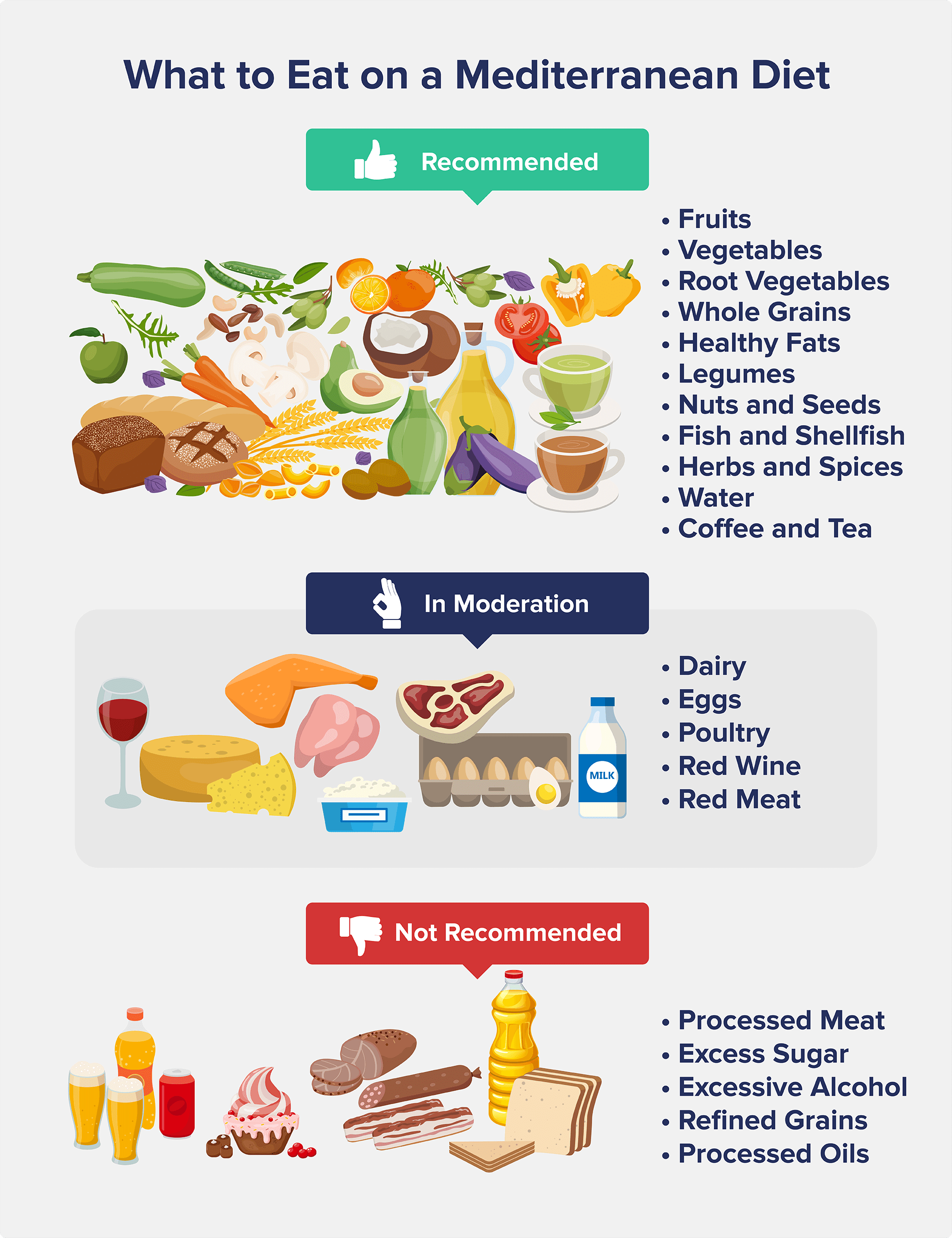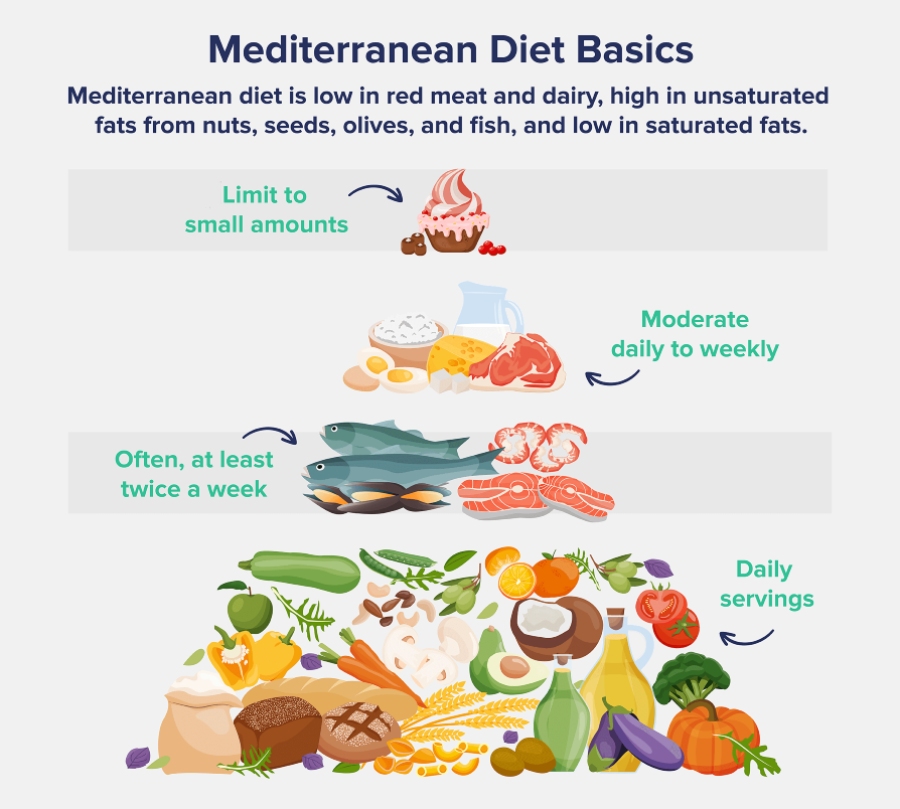Named the top diet in the world several years in a row, the Mediterranean diet is a heart-healthy style of eating, full of fruits, vegetables, healthy fats, lean proteins, and fiber-rich beans and grains.
Whether you’re looking to make the switch to a different diet or just want some new healthy recipes, this Mediterranean meal plan for beginners can help get you started.
Mediterranean Diet Basics
The Mediterranean diet contains an abundance of fiber-rich foods, like fruits, vegetables, beans, and whole grains.
Although not a vegetarian diet, this pattern of eating is plant-forward, with the majority of animal protein coming from seafood.
The Mediterranean diet is low in red meat and dairy, providing plenty of unsaturated fats from nuts, seeds, olives, and fish, while keeping saturated fat intake low.
What to Eat on a Mediterranean Diet
From its abundant olive orchards to its plethora of oily fish, the traditional diets of the countries in the Mediterranean region are acclaimed for both delicious flavors and high nutritional value.
Although there are 21 countries that touch the Mediterranean Sea, this diet typically refers to the cuisine commonly consumed in Greece, Italy, southern France, and southern Spain.
The main foods to consume freely and often on a Mediterranean diet include:
- Fruits: Apples, pears, bananas, figs, dates, berries, melons, etc.
- Vegetables: Spinach, kale, Brussels sprouts, zucchini, cucumbers, tomatoes, asparagus, eggplant, broccoli, etc.
- Root vegetables: Sweet potatoes, potatoes, beets, onions, garlic, turnips, carrots, etc.
- Whole grains: Oats, quinoa, whole wheat, brown rice, buckwheat, barley, or rye
- Healthy fats: Olives, olive oil, and avocados
- Legumes: Beans of all kinds (black beans, white beans, kidney beans, etc.), chickpeas, peas, and lentils
- Nuts and seeds: Pistachios, almonds, walnuts, hazelnuts, sesame seeds, flax seeds, etc., and nut butter or seed butter (like tahini)
- Fish and shellfish: Salmon, tuna, shrimp, mackerel, herring, cod, clams, sardines, white fish, mussels, etc. (It’s recommended to eat seafood twice per week or more)
- Herbs and spices: Garlic, cilantro, cumin, basil, mint, cinnamon, oregano, rosemary, sage, nutmeg, bay leaf, dill, turmeric, pepper, etc.
- Water: Plain water should be the primary beverage
- Coffee and tea: Should remain unsweetened or lightly sweetened
Some foods are not eliminated but are encouraged to be consumed in moderation, including:
- Dairy: Fermented dairy is preferred, such as yogurt or kefir. Cheese can also be consumed in moderation (like feta, halloumi, ricotta, parmesan, and pecorino), while milk, butter, and cream are rarely eaten.
- Eggs: Not every day, but a few times per week.
- Poultry: Chicken, turkey, and duck are moderately consumed about one to two times per week.
- Red wine: In moderation—no more than one 5-ounce glass per day.
- Red meat: Beef, pork, and lamb should be very limited and eaten rarely.
What Not to Eat on a Mediterranean Diet
Although the Mediterranean diet is very balanced, there are some foods that are not recommended, including:
- Processed meat: Deli meats, hot dogs, bacon, ham, and processed sausages
- Excess added sugar: Desserts, soda, sweetened drinks, pastries, candy, and many processed foods
- Excessive alcohol, or alcohol other than red wine
- Refined grains: White bread, white pasta, crackers, chips, white rice
- Processed oils: Canola, soybean, cottonseed, corn, or vegetable oil
7-Day Mediterranean Diet Meal Plan for Beginners
Day 1
Breakfast: Greek-Style Scramble with Eggs, Feta, Spinach, and Tomato
- 2 eggs
- 1 cup of fresh baby spinach
- ½ cup cherry tomatoes
- ¼ cup feta cheese
- Whisk eggs with salt and pepper, and add to a lightly oiled pan on medium heat
- Add other ingredients and scramble them together
Snack: Nuts and Fruit
- ¼ cup of nuts and ½ cup of fruit
- Ex: Pistachios and raspberries, or walnuts and sliced apple
Lunch: Tuna Salad Cucumber Boats
Dinner: Date Pistachio Crusted Salmon
Day 2
Breakfast: Greek Yogurt with Berries and Honey
- 1 cup 2% fat unsweetened Greek yogurt
- 1 cup fresh raspberries
- ¼ cup almonds, chopped
- 1 teaspoon honey (optional)
Lunch: Arugula Salad with Farro, Walnuts, and Feta
- 2 cups fresh baby arugula
- ½ cup cooked farro
- ¼ cup chopped walnuts
- ¼ cup feta
- Olive oil and lemon vinaigrette
Snack: Banana Oatmeal Cookies
Dinner: Veggie Pasta Bake
- Use pasta made from chickpeas, lentils, or whole wheat
Day 3
Breakfast: Easy Breakfast Smoothie
Snack: Hummus and Veggie Sticks
Lunch: Tuna Salad Pita
- 1 whole-wheat pita bread
- 1, 5-ounce can of tuna, drained
- ¼ cup plain, non-fat Greek yogurt
- 1 Tbsp mustard
- 2 Tbsp chopped pickles
- 2 Tbsp red onion, diced
- ¼ cup celery, diced
- 1 cup raw baby spinach, loosely packed
Dinner: Baked Cod with Lemon and Garlic and Chopped Veggie Lemon Salad
- Add juice from 1 lemon and 2 cloves of minced garlic per pound of cod in a baking dish
- Season with salt and pepper and drizzle with olive oil
- Bake at 400 F until fish is cooked through and flakes easily, about 10 minutes
- Chopped Veggie Lemon Salad Recipe
Day 4
Breakfast: Oatmeal with walnuts and raspberries plus a side of Golden Milk
- ½ cup of cooked oatmeal with ¼ cup of chopped walnuts and ½ cup of raspberries
- Golden Milk
Lunch: Lentil Salad with Feta, Tomatoes, Cucumbers, and Olives
- ½ cup of cooked lentils
- ¼ cup of crumbled feta
- ½ cup each of cherry tomatoes and diced cucumber
- ¼ cup of chopped olives
Snack: Chocolate Chia Pudding
Dinner: Lemon-Garlic Shrimp, Orzo, and Broccoli Crunch Salad
- ½ cup cooked orzo
- Shrimp cooked in olive oil and minced garlic; drizzle with lemon juice after cooking
- Broccoli Crunch Salad
Day 5
Breakfast: Greek Yogurt with Tumeric Tahini Granola
Snack: Easy Yogurt Bark
Lunch: Mezze Platter
Dinner: Tuscan White Bean Soup
Day 6
Breakfast: Za’atar Fried Eggs and Whole-Wheat Toast
- Za’atar is a Middle Eastern spice blend of dried thyme, oregano, marjoram, sumac, toasted sesame seeds, and salt
- Gently fry 2 eggs in olive oil and sprinkle with za’atar
- Add eggs on top of whole wheat toast
Lunch: Mediterranean Quinoa Salad
Snack: Watermelon Feta Salad
Dinner: Greek Salad with Lemon Chicken
- Greek Salad: Lettuce, feta, cherry tomatoes, cucumber, olives, and an olive oil and lemon vinaigrette
- Baked Lemon Chicken
Day 7
Breakfast: Blueberry Bars
Lunch: Veggie Orzo Soup
- Soup with chopped carrots, celery, kale, orzo, vegetable broth, salt, pepper, garlic, and oregano
Snack: Almond Butter Stuffed Dates
Dinner: Baked Salmon and Parmesan Zucchini Fries
- Salmon marinated in lemon juice, olive oil, salt, and pepper; Bake at 400 F for 10-12 minutes or until cooked through
- Parmesan Zucchini Fries
Mediterranean Diet Plan FAQs
What Is a Typical Meal for a Person on a Mediterranean Diet?
The Mediterranean diet is rich in fruits, vegetables, whole grains, beans, fish, nuts, and olive oil.
A typical meal for someone on a Mediterranean diet might be salmon, roasted vegetables, and a whole grain like quinoa.
Are Potatoes OK on a Mediterranean Diet?
Yes, potatoes are okay on the Mediterranean diet.
What Is a Typical Mediterranean Breakfast?
A typical Mediterranean breakfast may include eggs (a couple of times per week), vegetables, fresh fruit, or a grain like oatmeal.
What Cheese Is OK on the Mediterranean Diet?
All cheese is okay in moderation on the Mediterranean diet, but common cheeses consumed include feta, halloumi, pecorino, parmesan, ricotta, and mozzarella.
What Foods Are Not Allowed on the Mediterranean Diet?
The Mediterranean diet recommends not consuming excess sugar, highly processed foods, processed meats like hot dogs and bacon, excess alcohol, refined grains, and processed oils.
It’s recommended to limit or very rarely eat red meat.

